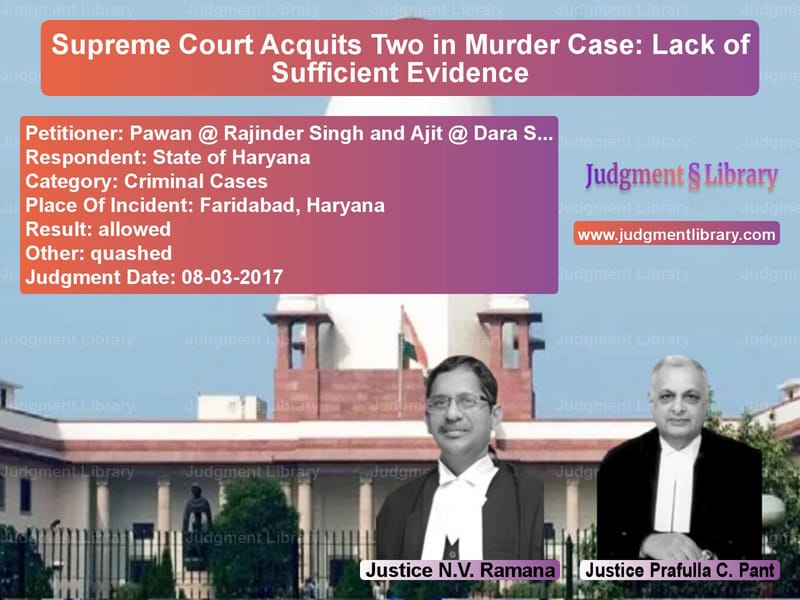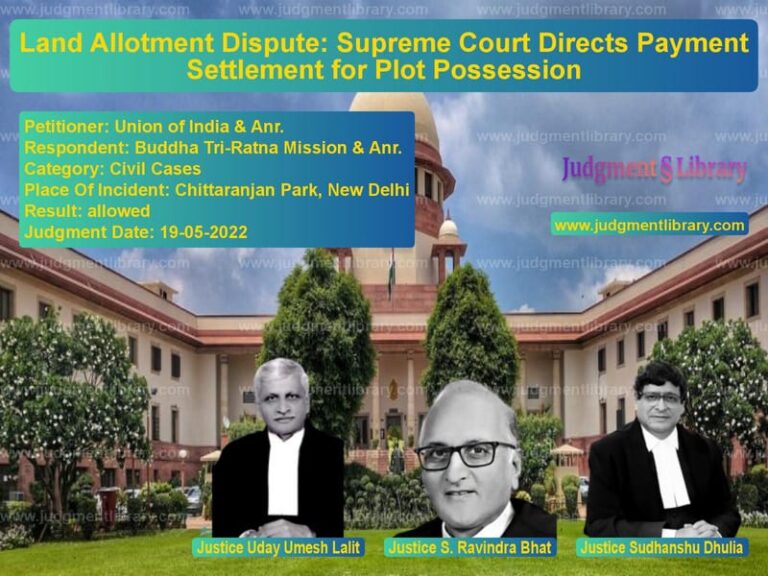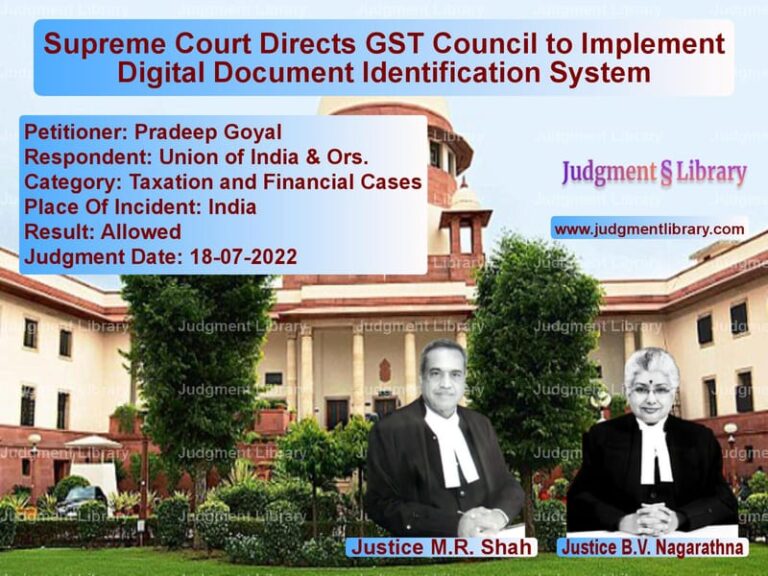Supreme Court Acquits Two in Murder Case: Lack of Sufficient Evidence
The case of Pawan @ Rajinder Singh and Another vs. State of Haryana is a landmark ruling by the Supreme Court of India concerning the burden of proof in criminal cases. The judgment reinforces the principle that the prosecution must establish guilt beyond a reasonable doubt, and any doubt must be resolved in favor of the accused.
Background of the Case
The appellants, Pawan @ Rajinder Singh and Ajit @ Dara Singh, were convicted under Section 302/34 of the Indian Penal Code for the alleged murder of one Deepak. The case was based on circumstantial evidence and the testimony of two alleged eyewitnesses.
The sequence of events was as follows:
- On November 9, 2000, an altercation took place between the accused and the deceased over a minor loan dispute.
- Later that night, the accused allegedly took the deceased on their scooter.
- The next morning, the body of the deceased was found near an Air Force ground.
- The police arrested the accused based on suspicion and circumstantial evidence.
- The Trial Court convicted them, and the Punjab and Haryana High Court upheld the conviction.
- The accused then appealed before the Supreme Court of India.
Legal Issues Before the Supreme Court
- Was the prosecution able to establish guilt beyond a reasonable doubt?
- Were the testimonies of the prosecution witnesses reliable?
- Did the forensic evidence support the prosecution’s case?
Arguments by the Appellants (Pawan @ Rajinder Singh and Ajit @ Dara Singh)
The appellants contended:
- The case was based on circumstantial evidence with no direct proof.
- The prosecution relied on two so-called ‘eyewitnesses’ whose presence at the crime scene was questionable.
- Forensic evidence did not conclusively link the accused to the crime.
- The alleged motive for the crime was trivial, making the prosecution’s theory implausible.
Arguments by the Respondent (State of Haryana)
The State contended:
- The accused had taken the deceased with them on the night of the incident.
- Two eyewitnesses testified that they heard a gunshot and saw the accused near the scene.
- A country-made pistol was recovered from one of the accused.
- The forensic report showed that a bullet was retrieved from the deceased’s body.
Supreme Court’s Observations
The Supreme Court closely examined the evidence and found several inconsistencies:
- The eyewitnesses were ‘chance witnesses’ whose testimony was unreliable.
- The forensic report did not conclusively prove that the recovered pistol was used in the crime.
- The prosecution failed to provide a clear motive for the murder.
- The alleged loan dispute did not appear to be a strong enough reason for premeditated murder.
The Court stated:
“The prosecution has failed to prove the guilt of the accused beyond a reasonable doubt. The evidence presented does not establish a chain of events leading to an inescapable conclusion of guilt.”
Furthermore, the Court emphasized:
“Circumstantial evidence must be conclusive and lead to only one hypothesis—the guilt of the accused. If there is any reasonable alternative explanation, the accused must be given the benefit of the doubt.”
Final Judgment
On March 8, 2017, the Supreme Court ruled:
- The appeal by Pawan @ Rajinder Singh and Ajit @ Dara Singh was allowed.
- The conviction was set aside, and the accused were acquitted of all charges.
- The accused were ordered to be released immediately if not required in any other case.
Legal Implications of the Judgment
This ruling reinforces fundamental principles in criminal law:
- Presumption of Innocence: Accused persons must be proven guilty beyond a reasonable doubt.
- Burden of Proof: The prosecution must establish a direct and clear link between the accused and the crime.
- Reliability of Witnesses: ‘Chance witnesses’ must be scrutinized carefully before accepting their testimony.
- Forensic Evidence: Scientific evidence must conclusively link the accused to the crime scene.
Impact on Future Criminal Cases
This judgment sets an important precedent:
- Circumstantial evidence must be watertight to secure a conviction.
- Courts must critically examine witness credibility.
- Judges must ensure that innocent individuals are not convicted based on mere suspicion.
Conclusion
The Supreme Court’s decision in Pawan @ Rajinder Singh and Another vs. State of Haryana underscores the importance of a fair trial and the requirement for solid evidence in criminal cases. The ruling ensures that justice prevails by preventing wrongful convictions based on weak and inconclusive evidence.
Don’t miss out on the full details! Download the complete judgment in PDF format below and gain valuable insights instantly!
Download Judgment: Pawan @ Rajinder Sin vs State of Haryana Supreme Court of India Judgment Dated 08-03-2017.pdf
Direct Downlaod Judgment: Direct downlaod this Judgment
See all petitions in Murder Cases
See all petitions in Bail and Anticipatory Bail
See all petitions in Evidence Law
See all petitions in Judgment by N.V. Ramana
See all petitions in Judgment by Prafulla C. Pant
See all petitions in allowed
See all petitions in Quashed
See all petitions in supreme court of India judgments March 2017
See all petitions in 2017 judgments
See all posts in Criminal Cases Category
See all allowed petitions in Criminal Cases Category
See all Dismissed petitions in Criminal Cases Category
See all partially allowed petitions in Criminal Cases Category







